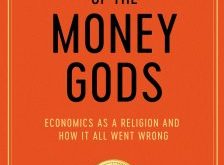Contrary to the tenets of orthodox economists, contemporary research suggests that, rather than seeking always to maximise our personal gain, humans still remain reasonably altruistic and selfless. Nor is it clear that the endless accumulation of wealth always makes us happier. And when we do make decisions, especially those to do with matters of principle, we seem not to engage in the sort of rational “utility-maximizing” calculus that orthodox economic models take as a...
Read More »Diskriminering — en fråga om preferenser eller information?
Diskriminering — en fråga om preferenser eller information? Preferensbaserad diskriminering bygger på att exempelvis arbetsgivare, kunder eller medarbetare hyser en motvilja mot dem som tillhör en viss grupp. Sådan diskriminering kan leda till löneskillnader mellan diskriminerade och icke-diskriminerade grupper. Löneskillnaderna kan emellertid undermineras av konkurrens, som gör att arbetsgivare utan diskriminerande preferenser kommer att göra större vinst...
Read More »Nationalekonomins verktyg
I denna nyutkomna bok presenterar Mikael Priks och Jonas Vlachos — professorer i nationalekonomi vid Stockholms universitet — en genomgång av viktiga metoder ekonomer har till sitt förfogande för att göra empiriska analyser av stora och aktuella samhällsfrågor. Med utgångspukt i ekonometriska och statistiska modeller diskuterar man vilka olika identifikationsansatser som används för att undgå olika former av ‘selektionsbias’ när ekonomer försöker utröna kausala...
Read More »The money multiplier – neat, plausible, and utterly wrong
The money multiplier – neat, plausible, and utterly wrong The mainstream textbook concept of money multiplier assumes that banks automatically expand the credit money supply to a multiple of their aggregate reserves. If the required currency-deposit reserve ratio is 5%, the money supply should be about twenty times larger than the aggregate reserves of banks. In this way, the money multiplier concept assumes that the central bank controls the money supply...
Read More »Luigi Pasinetti (1930-2023) In Memoriam
Luigi Pasinetti (1930-2023) In Memoriam Sad news has reached us today. Only two weeks after Victoria Chick’s death, another giant among Post Keynesian economists, Luigi Pasinetti, passed away yesterday at the age of 92. R.I.P.
Read More »Economic forecasting — why it matters and why it is so often wrong
Economic forecasting — why it matters and why it is so often wrong As Oskar Morgenstern noted in his 1928 classic Wirtschaftsprognose: Eine Untersuchung ihrer Voraussetzungen und Möglichkeiten, economic predictions and forecasts amount to little more than intelligent guessing. Making forecasts and predictions obviously isn’t a trivial or costless activity, so why then go on with it? The problems that economists encounter when trying to predict the future...
Read More »Hyman Minsky and the IS-LM obfuscation
Hyman Minsky and the IS-LM obfuscation As a young research stipendiate in the U.S. yours truly had the pleasure and privilege of having Hyman Minsky as a teacher. He was a great inspiration at the time. He still is. The concepts which it is usual to ignore or deemphasize in interpreting Keynes — the cyclical perspective, the relations between investment and finance, and uncertainty, are the keys to an understanding of the full significance of his...
Read More »Systembrus
En vanlig missuppfattning när det gäller oönskad variabilitet i bedömningar är att det inte spelar någon roll eftersom slumpfel tar ut varandra. Det stämmer att positiva och negativa fel i en bedömning av samma fall mer eller mindre tar ut varandra och vi kommer att diskutera mer i detalj hur denna omständighet kan utnyttjas för att minska bruset. Men brusiga system gör inte flera bedömningar av samma fall. De gör brusiga bedömningar av olika fall. Om en försäkring har för hög...
Read More »Victoria Chick (1936-2023) In Memoriam
Victoria Chick (1936-2023) In Memoriam Sad news has reached us today. One of the leading Post Keynesian economists, Victoria Chick, passed away yesterday at the age of 86. R.I.P.
Read More »Is an economics degree really worth it?
Is an economics degree really worth it? .[embedded content] A science that doesn’t self-reflect on its own history and asks important methodological and science-theoretical questions about its own activity is in dire straits. Already back in 1991, a commission chaired by Anne Krueger and including people like Kenneth Arrow, Edward Leamer, and Joseph Stiglitz, reported from their own experience “that it is an underemphasis on the ‘linkages’ between tools,...
Read More » Heterodox
Heterodox







